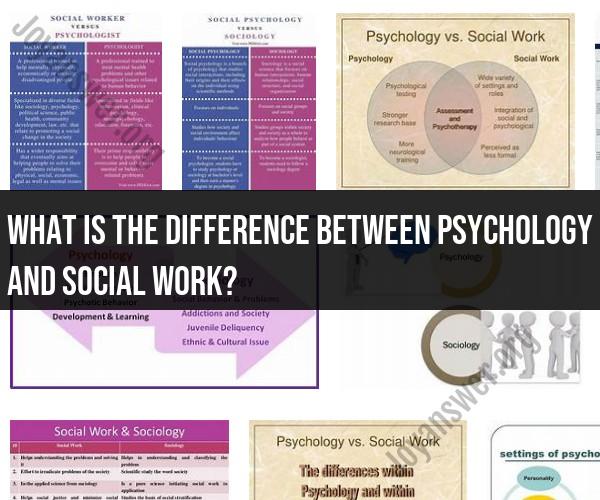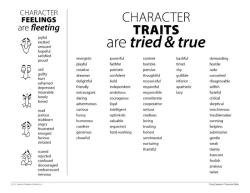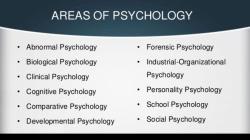What is the difference between psychology and social work?
Psychology and social work are distinct fields that focus on different aspects of human behavior and well-being, although there can be some overlap in certain areas. Here are the key differences between psychology and social work:
Psychology:
Focus: Psychology is the scientific study of the mind and behavior. It explores various aspects of human cognition, emotion, personality, development, and mental processes. Psychologists seek to understand how individuals think, feel, and behave.
Scope: Psychologists work in a wide range of settings, including research institutions, universities, clinics, hospitals, private practice, schools, and businesses. They may conduct research, provide therapy or counseling, assess and diagnose mental health conditions, and offer interventions to address psychological issues.
Education: To become a psychologist, one typically needs a doctoral degree in psychology (Ph.D. or Psy.D.), which involves extensive training in research, clinical practice, and specialized areas of psychology.
Licensing: Psychologists often require licensure to practice independently. Licensing requirements vary by state and country.
Roles: Psychologists can have various roles, including clinical psychologists (providing therapy and counseling), research psychologists (conducting studies), industrial-organizational psychologists (working in businesses), and educational psychologists (working in schools), among others.
Social Work:
Focus: Social work is a profession that focuses on helping individuals, families, and communities to improve their well-being and quality of life. Social workers address social and environmental factors that can impact people's lives, including poverty, addiction, abuse, and access to resources.
Scope: Social workers often work in settings such as hospitals, schools, mental health clinics, government agencies, non-profit organizations, and social service agencies. They provide a wide range of services, including counseling, case management, advocacy, and community organizing.
Education: To become a social worker, one typically needs at least a bachelor's degree in social work (BSW) for entry-level positions. Clinical social workers may require a master's degree in social work (MSW), which includes supervised clinical training.
Licensing: Clinical social workers often need state licensure to practice independently. Licensing requirements vary by state.
Roles: Social workers can specialize in areas such as clinical social work (providing therapy and counseling), medical social work (working in healthcare settings), school social work (supporting students and families), and macro social work (addressing systemic issues), among others.
Overlap: While psychology and social work are distinct fields, there is overlap, particularly in the area of mental health. Both psychologists and clinical social workers may provide counseling and therapy to individuals experiencing psychological distress. However, psychologists often focus more on assessment and diagnosis, while social workers may have a broader focus on addressing social and environmental factors that contribute to mental health issues.
In summary, psychology primarily focuses on understanding and studying human behavior and cognition, while social work is focused on helping individuals and communities address social and environmental challenges that affect their well-being. Both fields play essential roles in supporting individuals and promoting mental health and social welfare.
Psychology vs. Social Work: Distinguishing Between Two Professions
Psychology and social work are both human service professions that focus on helping people. However, there are some key differences between the two fields.
Psychology is the scientific study of the mind and behavior. Psychologists use their knowledge to diagnose and treat mental disorders, as well as to help people improve their mental well-being. Psychologists may work in a variety of settings, including private practice, hospitals, schools, and businesses.
Social work is a profession that focuses on helping people and communities address social problems. Social workers work with individuals, families, groups, and communities to identify and address problems such as poverty, homelessness, addiction, and domestic violence. Social workers may work in a variety of settings, including government agencies, non-profit organizations, and schools.
Understanding the Fields: The Difference Between Psychology and Social Work
Here is a table that summarizes the key differences between psychology and social work:
| Characteristic | Psychology | Social Work |
|---|---|---|
| Focus | Mind and behavior | Social problems |
| Education | PhD or PsyD in psychology | Master's degree in social work (MSW) |
| Licensure | Required in most states | Required in most states |
| Work settings | Private practice, hospitals, schools, businesses | Government agencies, non-profit organizations, schools |
A Career Crossroads: Choosing Between Psychology and Social Work
If you are interested in helping people and making a difference in the world, both psychology and social work are rewarding career choices. However, it is important to choose the profession that is right for your interests and skills.
If you are interested in the scientific study of the mind and behavior, and you want to help people understand and improve their mental well-being, then psychology may be the right career choice for you.
If you are interested in addressing social problems and making a difference in the community, then social work may be the right career choice for you.
Ultimately, the best way to decide which profession is right for you is to learn more about both fields and talk to people who work in both fields. You can also take career assessments to help you identify your interests and skills.
Here are some additional questions you may want to consider when choosing between psychology and social work:
- What are your specific interests? Do you want to work with individuals, families, groups, or communities? Do you want to work in a clinical or research setting?
- What are your skills? Are you good at listening and helping people solve problems? Are you able to work independently and as part of a team?
- What are your career goals? Do you want to start your own practice? Do you want to work in a specific setting, such as a school or hospital?
Once you have considered these factors, you can make a more informed decision about which profession is right for you.













